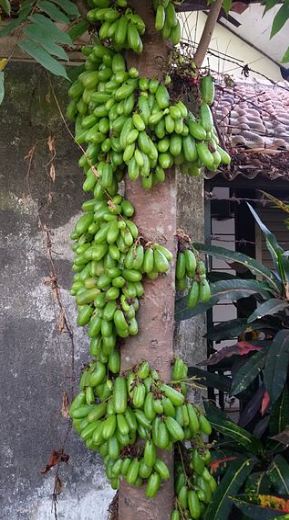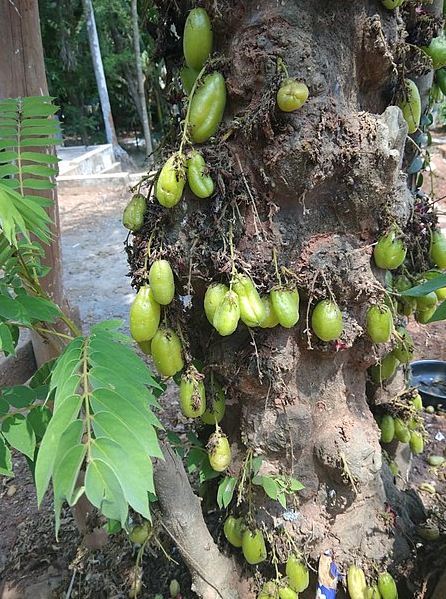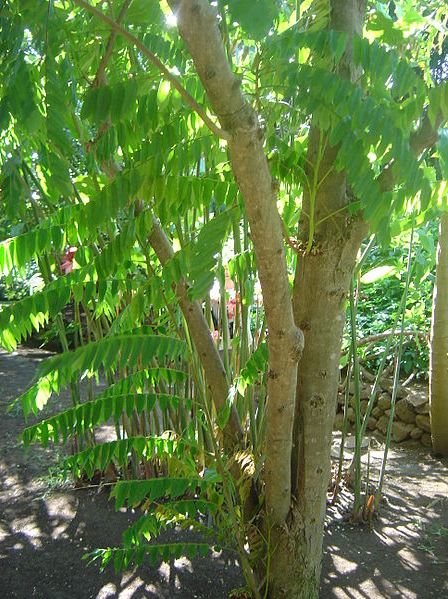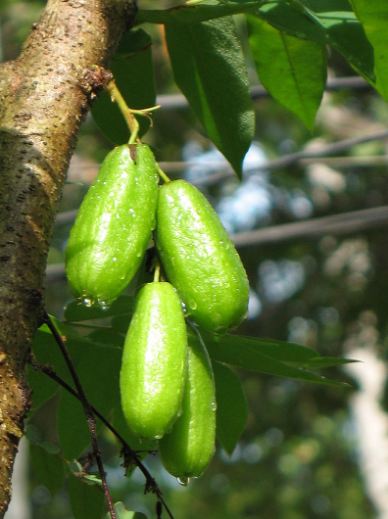Averrhoabilimbi is commonly known as bilimbi, cucumber, or sorrel tree. It is a fruit-bearing Averrhoa tree, belonging to the family Oxalidaceae. It is an acceptable name for a species of the genus Averrhoa (family Oxalidaceae) and is officially declared by WCSP.
Where Can You Find Bilimbi?
It was originated in Moluccas, Indonesia, but now, the species is cultivated and found throughout Indonesia, the Philippines, Sri Lanka, Bangladesh, Maldives, Myanmar (Burma), and Malaysia. It is also popular in some Southeast Asian countries. In India, where it is commonly found in gardens, bilimbi has been found in the wild in the country’s warmest parts. It is also seen in the coastal regions of South India.
A Brief Description of the Plant
Here is how the USDA (United States Department of Agriculture) has defined this plant: Averrhoa is a small tropical tree indigenous to Malaysia and Indonesia. It usually reaches a height of 15m and is usually multi-trunked, quickly split into ramifications. The leaves of Bilimbi are flexible, narrow, and very similar to those of Otaheite gooseberry. The flowers are heterostylous, bearing a magnificent panicle inflorescence. Their flowers are very fragrant.
Talking about its fruit, it is ellipsoidal and elongated. The skin, smooth and with little bumps, is thin and turns from light green to yellow-green when ripe. Inside, it is a little bit crispy, and the juice is sour and highly acidic, so it is rarely used as a fresh fruit alone. Fruits are often preserved and used as a popular flavoring/spice and are a key ingredient in many Indonesian dishes. Some of them are sambalbelimbingwuluh and Asamsunti.
Benefits of Bilimbi
Due to its wholesome constituents, it should be a part of your meal in various ways. Different studies are performed to examine why it should be a part of our daily meals, and bilimbi has not failed to prove how nutritious it is.
1. Regulates Blood Sugar Levels
Bilimbi fruit can help control blood sugar levels by monitoring insulin activity in the body. The rich content of flavonoids and dietary fiber in bilimbi fruit prevent sudden spikes in blood glucose levels following a meal, thus keeping the symptoms of diabetes at bay.
For more information, click here.
2. Helps Manage High Blood Pressure
The richness of antioxidants and proteins in the fruit makes it an excellent natural remedy to lower high blood pressure or hypertension. Eating broth with hot fruit boiled in hot water helps reduce high blood pressure, dilates arteries, veins, and capillaries, and relaxes the heart muscle.
3. Effectively Manages Hemorrhoids
Bilimbi contains strong anti-inflammatory properties of tannins and terpenes. This reduces inflammation in the arteries of the anus and rectum, a condition known as hemorrhoids. Incorporating fruit and leaf extracts from the affected region significantly reduce pain, inflammation and bleeding, and repairs hemorrhoids.
To study more about this, click here.
4. Helps Treat Cough and Cold
Large reservoirs of vitamin C in bile provide excellent benefits for the functioning of the immune system. This, in turn, cures coughs and colds due to seasonal changes and allergies, which strengthen the immune system. There are several ways how it can be used to treat seasonal cough and cold – click here to read some of them.
5. Strengthens Bone Health
Bilimbi is loaded with a gentle amount of calcium, which strengthens bones and maintains the integrity of the bone structure in the body. Bilimbi extracts in the form ofdried fruit can be included in curries and ribs or as pickles. This can help toughen bones significantly.
6. Regulates Diabetes
Bilimbi fruit is known to lower blood sugar levels. There are two ways to control blood sugar levels: first, make Bilimbi fruit juice and drink it like any other fruit juice. Secondly,boil the fruit with one cup of water until half the water evaporates. After that, take the decoction by removing the stew and drink it twice a day.
7. May Help with Obesity
Bilimbi fruit is used as a traditional weight loss medicine in India. Indigenous people consider bilimbi fruit to contain anti-hyperlipidemic agents that can prevent weight gain. Obesity can lead to various diseases and also make our skin and hair look dull.
8. An Antibacterial Drug
Sap from small heads and leaves of Bilimbi are used in traditional medicine to reduce inflammation, rheumatism, itching, and insect bites. The small stems and leaves are peeled with 3-4 cloves of garlic and made into a smooth paste, which is used on the affected area of the skin. The astringent effect will reduce inflammation and pain in rheumatism and reduce inflammation caused by skin rashes and insect bites.
9. Physical Therapy
Allergies are a condition caused by hypersensitivity of the immune system to certain substances outside the body. Symptoms can include red eyes, respiratory disturbances, runny nose, skin itching, and more, which are as serious as Steven-Johnson syndrome. Drinking juice of bilimbi or bilimbi stops giving it regularly helps to reduce allergies.
Ethnomedical Uses
According to various surveys done in Malaysia, A. Bilimbi has been used in traditional medicine to treat various ailments. Infusions and decoctions of the leaves are used as antibacterial, ant scorbutic, astringent, antidepressant medications to treat fever, rectal inflammation, and diabetes.
The leaf paste is used to treat bites, abscesses, skin rashes, itching of toxic organisms, rheumatism, coughs, colds, cuts, and syphilis. Minced Bilimbifruit, seasoned with salt, can be applied to the face to treat acne. Moreover, its juice can be used to treat curvy, bilious colic, cough, high blood pressure, obesity, and diabetes.
For more information on its ethnomedical uses, click here.
Applications
Bilimbi fruit can be processed into pickles, chutneys, and preserves. Fruits can be used to add a sour taste to sambal (chili in Southeast Asia), curries, and soups. Bilimbi fruit blends well with fish, shrimp, and heavy pork-like meat.
In rural areas of the Philippines and Maharashtra, and Goa in India, fruits are eaten raw – eaten as it or added to rock salt. Bilimbi is sometimes used in modern food, blending well with flavors such as cassia bark, star anise, orange and zest, and mint. Bilimbi fruit can be stored for up to one week in the refrigerator.
Conclusion
Bilimbi fruit is widely included in traditional folk medicine around the world. In Malaysia, a mixture of leaves and fruit was used to treat syphilis, while a drink made from boiled leaves, fruits, and flowers was used to treat a cough. Bilimbi fruit juice was used as an eye ointment to help treat acne.
Moreover, bilimbi acid juice was used as a household cleaning agent; in the 19th century in the Philippines, it was used as hand soap. Malay people have also found that juice works to remove rust from their traditional cherries. If you want to add a healthy fruit to your diet, you can go for bilimbifruit as it has incredible effects on health.




